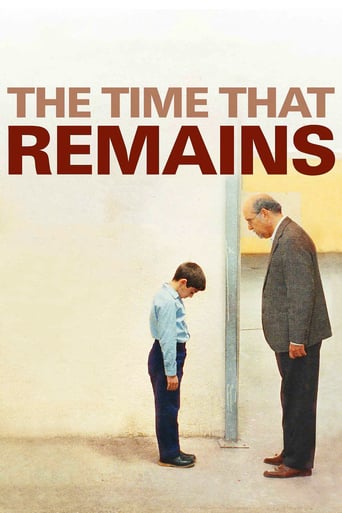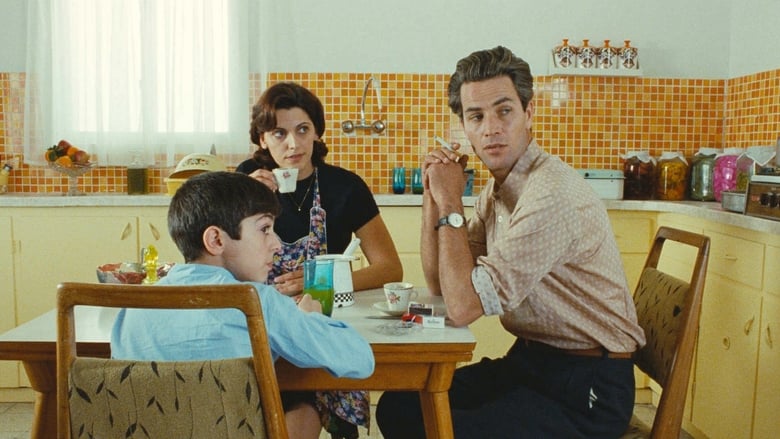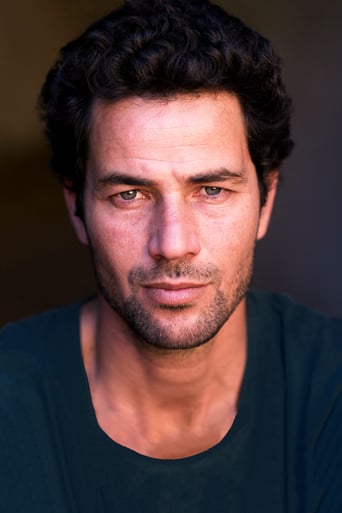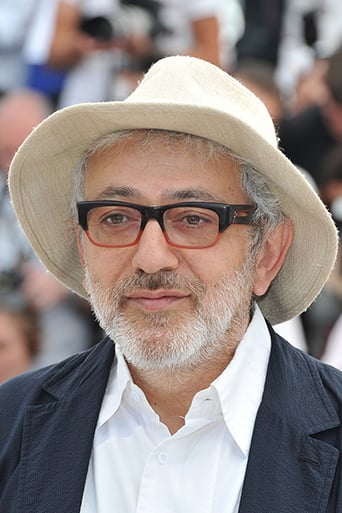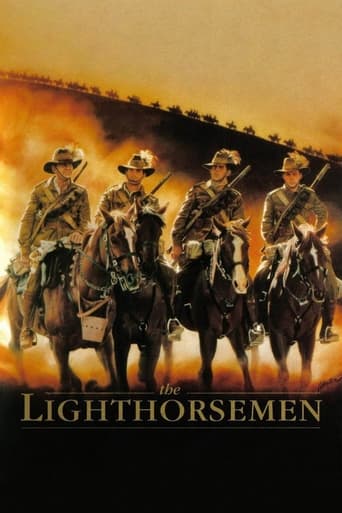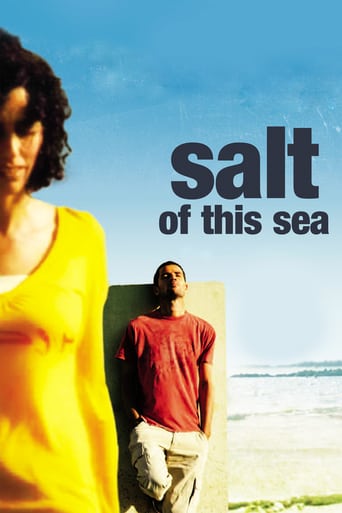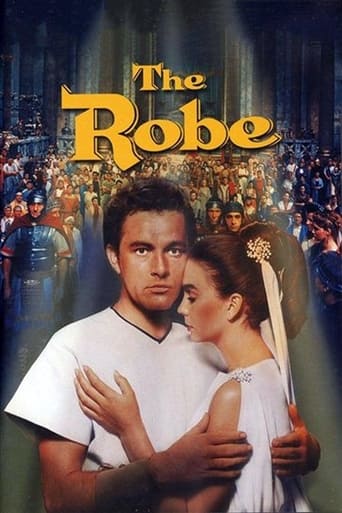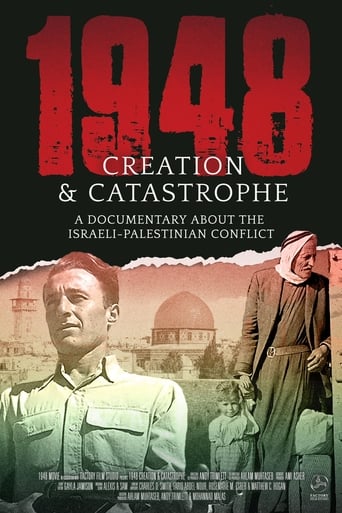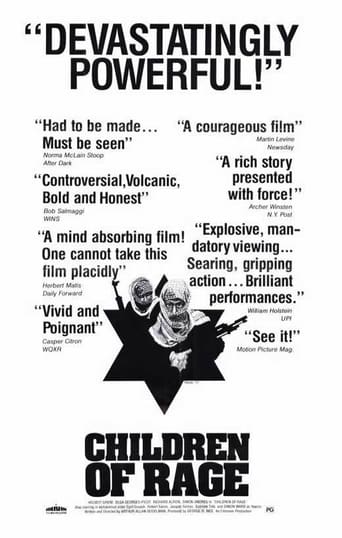The Time That Remains (2011)
An examination of the creation of the state of Israel in 1948 through to the present day. A semi-biographic film, in four chapters, about a family spanning from 1948 until recent times. Combined with intimate memories of each member, the film attempts to portray the daily life of those Palestinians who remained in their land and were labelled "Israeli-Arabs," living as a minority in their own homeland.
Watch Trailer
Cast


Similar titles
Reviews
Redundant and unnecessary.
Highly Overrated But Still Good
Best movie ever!
All of these films share one commonality, that being a kind of emotional center that humanizes a cast of monsters.
This film has a very distinguished style and sense of humor for such a dark topic on the conflict of Israel and Palestine. It reflects three generations of the conflict through the perspective of Es (the protagonist) who plays a child, a teenager and an elder man. He never speaks perhaps as a metaphor representing the voiceless. One thing I was also able to appreciate as an Egyptian audience, the Egyptian songs by Laila Mourad and Mohamed Abdel Wahab, as well as some Egyptian news references, like on the death of Egypt's President Gamal Abdel Nasser in 1970. Something that a Western audience may not at all experience in the same way a Middle Eastern or Arabic Audience would, is almost like a cheery on the icing for people of that culture, a little gift made exclusively for us, that only we can feel nostalgic about and understand the reference to that culture and era. This film portrays the issue as a gray issue and does no only show the oppressive and inhuman acts of the Israeli Militants, like when they throw Es' father off a cliff. A few scenes show a very human side to them as well, like in the scene when they call out to stop a dance party because of curfew, the first idea that came to mind was the cultural deprivation, but when the military figures start dancing to the music track, it highlights that both sides unite by liking the same music. In another scene, when Israeli military move furniture items onto a truck, the listen to music and smoke cigarettes, somehow very subtly reveals them as ordinary military base figures on duty, it does not look so different from Egyptian bases. He also does not glorify all Palestinians as victims. We get to see a Palestinian who joins the Israeli military and is perceived as a traitor, and called out on it, but he explains later how he needs the work to feed his family. Another very interesting portrayal of how a land under an occupation becomes so natural and part of the backdrop and landscape of the environment, like in the scene when a guy on the cell phone who walks back and forth is pointed at with a tank tracking his every move. The guy does not react at all. This film had a very promising subtle message that the issue is gray and complicated and it seems to be a wish to focus on the good sides in both sides and bringing people together.
"The Time that Remains" is by far one of the most well-made and powerful Arab movies (and specifically Palestinian) to date. Elia Suleiman tackles one of the most prominent issues in the Arab world with beautiful imagery, nostalgia, music, and the silent word.I usually do not admire having a director act in his/her own film, but Elia Suleiman is his films, they are part of him and his appearance in them as the silent observer simply attacks the emotions and makes the viewer a part of his own life. "The Time that Remains" basically chronicles the life of his mother and father and their 'silent' resistance through the turmoil of the Israeli invasion of Palestine from 1948 till today.What is so powerful about this film is that how the viewer (and especially an Arab viewer) can go through a history of conflict so smoothly with much joy and come out with a striking view of this history. Suleiman shows will all simplicity how the cause still loves, without blood, with few words, but with a lot of emotions and things to say. The choice of music (classical Arabic songs) make the viewer understand what the beauty of being an Arab is, and how this beauty is slowly fading... fading into a lack of identity.I watched Suleiman's previous film "Divine Intervention" after watching this one and realized that we do have an Arab auteur director in our midst; his playful style and cartoonish characters all the more strengthen his cause and keep on his silent resistance.A pure must-see!
This is an evocative film by Elia Suleiman that was shown at IFC recently. The story takes us back to the city of Nazareth where the director was born. It is a chronicle of the events in that part of the world and the changes that have occurred there. It is basically an account of the life of Mr. Suleiman's parents as they lived the events that go back a number of years in the middle of the Israeli-Palestinian conflict that befell that area.Life as an Arab in Israel is examined by Mr. Suleiman at key points as they happened. Fuad, the father in the film, must deal with what comes his way. Life in the city goes through changes as history comes to change things for the family. There is a running joke about food sent from an aunt that no one wants. The main events happened in 1948, as the state of Israel was being born. Later periods take a look at other aspects of the life of what one feels is the family of Mr. Suleiman.The atmosphere of Nazareth, wit its amazing light is captured by the cinematographer Marc-Andre Batigne. Saleh Bacri, who plays Fuad, shows why he is one of the prominent actors working today. He made quite an impression in "The Band's Visit". The director, Mr. Suleiman shows up toward the end in an enigmatic segment where he seems to be absorbing the history he and his family witnessed in Nazareth.
The Time That Remains starts in 1948 in Palestine with the invasion by the Israeli armed forces. This event casts a long shadow over the entire movie. It's a Palestinian account, occasionally a very personal account, of how life has continued since then. The movie is contending that in cultural terms there's been a huge degradation, and people have lived in stasis, their lives not moving forward at all.The movie is a farce which reminds me of the Georgian cinematic tradition of military/political farces such as Brigands Chapter VII from Otar Iosseliani and Repentance from Tenghiz Abuladze. It's very funny at times, and very deadpan, but at others it's very poignant. For example there is literally a tug'o'war in a hospital corridor (shot from outside the building - a neutral absurd position typical of this film) between policemen and doctors concerning a wounded man on a gurney, who presumably is wanted for "questioning".It's an autobiographical film which is shot on a human level and is therefore a lot more palatable than other politically motivated movies on the Israeli-Palestinian conflict. It's a film that takes place over many years, culminating in the present day. Over the period there's a decline in health of the characters shown, and also in the cultural health, the young consume only American pop and films, gangsterism and culturally tolerated theft is commonplace. The movie could have been a lot stronger for sure on this point, Israeli forces have destroyed the Palestinian infrastructure. Given that it's a Palestinian point of view, I think it's remarkably even handed.Suleiman views the occupation as implacable, his neighbour (who is mentally broken by the occupation) one day converses with Suleiman's father and says that he's discovered the secret to fight the occupation, the answer is the (un-Muslim) option of drinking arak, once drunk on arak, the Israeli planes are close enough to be plucked out of the air. That's the level of impotence that I think the characters in the film feel about events.I think there's a sense of shame as well. I remember when Cheney's forces invaded Iraq, the speed with which they overcame the nation was viewed as a great shame for Arabs across the entire Middle East. The capitulation of Palestine is depicted the same way here, total and almost immediate, with the Mayor of Nazareth signing over the city to the Israelis without a word of protest. All we really see of Palestinian soldiers is a bunch of them jettisoning their keffiyehs and weapons and running for dear life before an engagement has even started. One man marches into an Israeli post and shoots himself as an act of defiance and protest, but this is portrayed with nil gravitas by Suleiman, as pointless as shouting at the wind.The film is really a treasure trove of absurd vignettes that I don't want to delve into too deeply and spoil the movie for you, but I've got a list of at least ten other highly memorable moments in this film.For you all you Americans out there, the movie is quite hostile towards American foreign policy. You won't see an American in the movie though. I don't think it's that controversial, it's pretty clear that the only real special relationship the US has had over the last half a century, in foreign policy terms, has been with Israel, and that's been to the detriment of the Palestinians.I think the movie is a masterpiece of cogent dissent.

